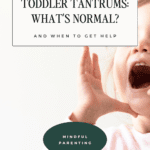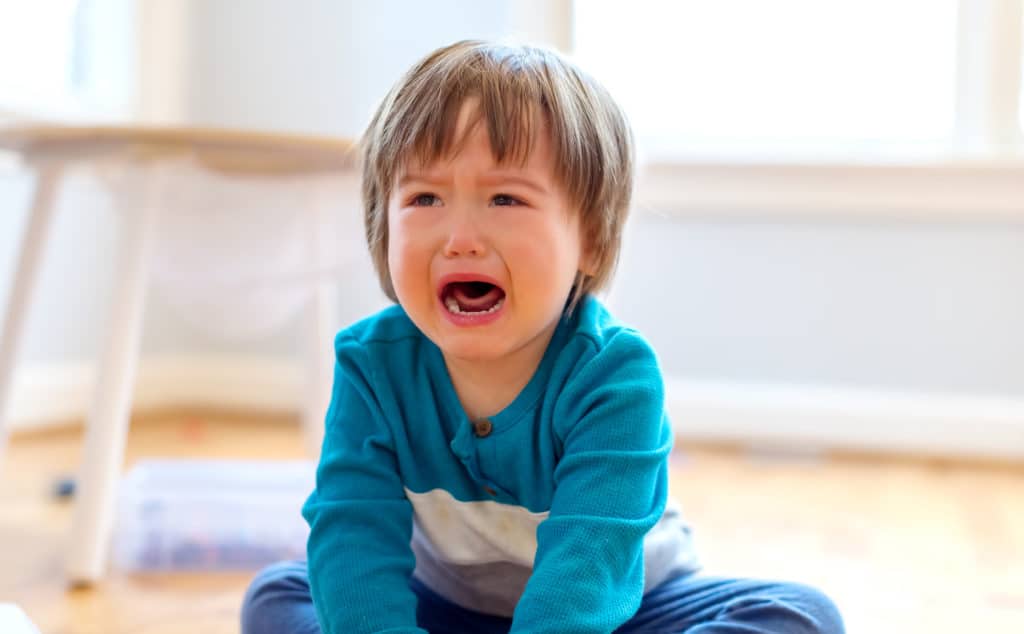
Tantrums can be excruciating for parents if you’re in the thick of it with your little one right now. And most parents dread the day their toddler has a tantrum in public. It can be embarrassing and frustrating.
But what if your toddler’s tantrums are more than just a phase? What if they’re actually a sign that something is wrong?
Let’s talk about toddler tantrums, how to help your toddler through their tantrums, and warning signs to look out for that suggest that your child might need outside help to address their tantruming.
Affiliate Disclosure: Some of the links in this post are affiliate links. This means that if you click on the link and purchase an item, I will receive a commission at no extra cost to you. I only recommend stuff I love and would recommend to a friend.
What are toddler tantrums and why do they start happening?
Toddler tantrums are a completely normal part of childhood development. They are a way for your child to release frustration and anger.
Tantrums typically occur during the toddler years, between 18 months and 3 years old. However, some children may have tantrums well into their preschool years.
How to deal with toddler tantrums
 Pin
PinThe best way to help with toddler tantrums is to remain calm and try to redirect your child’s attention to something else, if possible.
You may not want to give in to the child’s immediate demands, as this could reinforce tantrums as an effective way for your toddler to get you to take action.
Remember, your toddler is just trying to understand the world around them and communicate their needs. Try to provide a distraction, such as a toy or a book, or remove your child from the situation if possible.
Dealing with toddler tantrums with empathy
Toddlers are just small humans who don’t have much control in their world and it’s important to recognize that.
Their pre-frontal cortex is not anywhere close to fully developed, obviously, so it’s normal and expected for them to be emotionally immature.
As a parent, it’s your job to guide them through these emotions they’re having with empathy. Check out my ultimate guide to mindful parenting if you need some more in-depth help on how to model the behaviors you want to see in your child. Kids are much more likely if you don’t go with a “do as I say, not as I do” approach! Show them empathy and compassion and they will learn to be empathetic and compassionate people.
There are a few things you can do to help deal with the tantrums.
- First, make sure your toddler is getting enough sleep and has regular opportunities for physical activity. It may also help to create a consistent routine and avoid triggering situations (such as hunger or fatigue).
- During a tantrum, try to stay calm and provide comforting words or hugs. This can be difficult, especially if you have experienced any childhood trauma, but it’ll help your toddler feel less upset and safer around you. With time and patience, the tantrums will hopefully become less frequent.
- If you do struggle with not yelling at your toddler during tantrums, you’re not alone! We’re all a product of our environments and many of us experienced trauma as a child that makes yelling our go-to reaction for being overstimulated or intensely frustrated. You’re not alone in this but you CAN start making a change. Therapy is a great option, but so is learning about mindful parenting techniques. Raising Good Humans was the first book I read (well, I listened to the audiobook) on mindful parenting and I found it incredibly valuable.
- Provide a calming space for your child to retreat to if they need some quiet time to calm down and reset a little bit. A small tent, a beanbag, or some pillows in a corner on the floor with a small variety of books, puzzles, or sensory toys that are just for the “Calm Down Corner” can work really well to help some toddlers settle down and feel better after a tantrum.
Do I need to worry about toddler tantrums?
There is no one-size-fits-all answer to this question. Every child is different and will tantrum in their own way.
However, if you are concerned about your child’s tantrums, there are five signs to look out for. Here’s when to worry about toddler tantrums and look for help from a third party.
1. If your child’s tantrums are becoming frequent or violent
If your child is having difficulty regulating their emotions or if their tantrums are becoming increasingly violent, it may be time to seek help from a therapist or psychologist.
A therapist can teach your child how to better manage their emotions and provide you with tools to help deal with tantrums when they do occur. With some patience and understanding, you can help your child overcome their tantrums and develop into a more well-rounded individual.
2. If your child is hitting themselves or hurting others during a tantrum
If your child is hitting themselves or others during a tantrum, or if your child is hurting themselves during a tantrum, you should seek help from a healthcare professional. Hitting can’t be seen as an acceptable way for toddlers to communicate their feelings, but it doesn’t mean they are a bad kid.
They will just need some calm redirection each time they become angry enough to hit. Shows like Daniel Tiger tackle topics like hitting while angry, so check out that – it’s free on PBS.
There are also a lot of great books for toddlers on how to calm down when angry. These kinds of books can be helpful for some toddlers (one of mine had a hitting issue for a while!) and can help toddlers understand that hitting is hurtful. Here’s some of my favs for this topic:
- Train Your Angry Dragon
- When I Am Angry
- I Choose to Calm My Anger
- A Kids Book About Sharing
- A Little Book About Grit (This one is epic because my 4-year-old gets upset about not being good at something new on the first try and I feel like it helped her grasp that it’s okay and we can try again.)
3. Your child is having tantrums that are lasting longer than 30 minutes and happening more than three times per week
 Pin
PinWhile tantrums are a normal part of childhood development, there are some signs that you should look out for that may indicate a more serious problem.
If your toddler is having tantrums that are lasting longer than 30 minutes and happening more than three times per week, it’s important to stay calm and try to understand what might be causing the tantrums. It could be that your toddler is feeling overwhelmed or frustrated, or it could be a sign of an underlying medical condition.
If you’re unsure of the cause, it’s best to speak to your child’s pediatrician.
4. If tantrums are impacting your child’s ability to function in school or in other areas of their life
Professional help can be very beneficial in cases like this. If you’re unsure whether or not to seek help, talking to your child’s pediatrician is always a good first step. They can offer guidance and resources based on your unique situation and the local area.
5. If your toddler’s tantrums are becoming challenging for important relationships in his or her life
If your toddler’s tantrums are becoming a challenge for important relationships in his or her life, there are a few things you can do to help ease the situation.
First, try to identify the triggers for your child’s tantrums. Once you know what sets them off, you can try to avoid those situations as much as possible. If that’s not possible or practical, be prepared with some coping strategies, like deep breathing or walking away from the situation.
If the toddler’s tantrums happen around one specific person, you’ll need to get to the root of why your toddler is reacting that way to the person.
Sit down with that person and talk through it with them to get to the core of the issue. Sometimes adults need help regulating their emotions around toddler tantrums especially if they experienced a lot of yelling as a child themselves.
If you or another parent or guardian of your toddler uses yelling, hitting, or force of any kind in response to toddler tantrums, I encourage you to remind yourself that toddlers are not fully developed mentally or emotionally and it’s in their nature to have tantrums sometimes.
Explore mindful parenting techniques so that you or they can begin to practice responding to toddler tantrums in a healthy way. Here’s my favorite book on mindful parenting for beginners.
Where to get help for your child’s temper tantrums
If you are concerned about your child’s tantrums, or if they are having any of the signs that were mentioned above, you should consider speaking to a healthcare professional. They will be able to assess your child and provide you with guidance on how to best deal with their tantrums.
If you need additional support, there are many resources available. Parenting classes and support groups can be helpful, as well as books and websites on the topic.
There are Facebook groups that might be helpful for you – for example, Parenting with Anxiety, Gentle Parenting Support Group, and Moms with Tots 0-4 Years.
That’s only some of them! Use the search bar on Facebook and click on “groups” on the left side of the screen to find more groups that might be helpful to you if you’re looking for support or anecdotal advice.
You are not alone in this journey. There is help available if you need it. Good luck out there and go help your toddler crush their next tantrum!
Related reading

